Reviews
David Lynch
UK / USA, 1980
Credits
Review by Tom Huddleston
Posted on 01 October 2007
Source DVD
Categories 31 Days of Horror
In some strange way, The Elephant Man has managed to become David Lynch’s most undervalued film. At the time of its release, and for several years afterward, it was his key work, his most mature and respectable, and until Mulholland Drive his only Oscar nomination. But somewhere between Blue Velvet and Lost Highway, the years when Lynch’s signature style was being perfected, recognised, studied and parodied, The Elephant Man was lost, viewed (like its immediate successor Dune and perhaps, increasingly, The Straight Story) as a rewarding but atypical blip on an otherwise linear trajectory leading from The Alphabet to Inland Empire.
A plot summary feels wholly unnecessary: the story of John Merrick, and his symbolic importance within the wider world of Victorian England, has been exhaustively documented. Merrick stands for the new industrial poor slaving in subterranean dungeons; he stands for the outcast, the disabled, the exploited. His experience, and that of those who cared for him, encapsulates a moment of realisation throughout the Victorian world that all humanity, however different or frightening they may appear on the outside, share certain common needs and desires: companionship, security, creative expression, and though these might not make them necessarily equal, it certainly makes all men worthy of study and, hopefully, understanding.
Lynch extensively rewrote the original screenplay, jettisoning much of the fact-based material in favour of a more emotive (and more cinematic) vision. In his hands, the film undergoes a fascinating transition over the course of its runtime: as Merrick’s life gradually detaches from grim reality into a sort of wondrous, if charmingly modest wish fulfilment and back again, shifting between waking dream and living nightmare, so the film changes from a fairly realistic, if slightly overblown melodrama to an out-and-out fairytale, complete with monsters, dwarves and giants. It can be no accident that the first half of the film is riddled with references to time and punctuality—the hour of Dr. Treves’ meeting with Bytes or Merrick’s hospital appointment are clearly noted, and backed up with repeated images of clocks, from both within and without. But as the narrative develops this certainty dissolves: weeks and even months become meaningless, the story seems to fold back on itself and then just as suddenly leap forward: Sykes-like villain Michael Elphick’s plot to exploit Merrick seems to take months in the planning, then it all happens at once. We never know how long Merrick suffers at Bytes’ hands after his second abduction, and the freaks’ escape which follows seems to be leading us ever deeper into dreamland.
But there is little such ambiguity in the characters. Lynch is infamously partial to stark and easily definable male heroes and villains (Jeffrey Beaumont vs. Frank Booth, Dale Cooper vs. Bob), and The Elephant Man’s mythic landscape contains perhaps the most simplistic of all. Dr. Treves, Merrick, Bytes his hateful ‘owner,’ all these are broad, sometimes even clichéd representations: the sympathetic but conflicted modern doctor, the hardheaded matron with a heart of gold, the suffering victim, the brutal tormentor. The character of the City and its slovenly denizens is familiar from, among others, Dickens, and does not extend very far beyond those familiar working class stereotypes: the scamming spiv, the rosy-cheeked whore, the cheery tyke with his hand out. This is a world of bad people and good people, and even if the good people occasionally make a misstep, it’s only so they can realise their mistake and become even better.
The cast are uniformly and unsurprisingly excellent. John Hurt’s performance has been extensively praised, but it’s still astonishing to feel so much for an actor completely unrecognisable beneath so many layers of makeup. Anthony Hopkins shows occasional flashes of the ham he would soon become, but overall manages to give a performance of quiet and restrained dignity. On this viewing, it was two older hands who caught the attention: Wendy Hiller, looking like she’d just returned from ordering around the natives of her Scottish island in I Know Where I’m Going!, manages to imbue her character with more subtlety than the written part perhaps deserves, becoming the closest thing Merrick has to a living mother. And Freddie Jones is astonishing as Bytes: in what is inarguably the finest role of his career, Jones embodies a man utterly without scruples, wallowing in monstrous self pity, wheedling and cajoling and then lashing out at anyone within striking distance, most commonly the helpless Merrick.
The film is a visual marvel, the flawless, time consuming precision of Eraserhead filtered through Freddie Francis’ perfectionist classical aesthetic. This is perhaps the most referential of Lynch’s films, the director wearing his influences more openly than ever before or since: the giddy theatre sequence is clearly influenced by a similar set piece in Michael Powell’s The Red Shoes, while the carnival escape recalls not only the obvious Freaks, but also the dream geography of Night Of The Hunter. Horror film iconography is employed expertly, particularly in the first third of the film before we see Merrick’s face in full: the expressionistic use of light and shadow betrays the influence of Murnau and Jacques Tourneur. Interestingly, there are also clear visual cues to just about every other Lynch film: the blurred animal rape which opens the film foreshadows Bill Pullman’s transformation in Lost Highway; the grandiose theatre scene presages Mulholland Drive’s ‘Silencio’; the operatic journey into death, and the absolute ambiguity surrounding this event, conjures up images of Laura laughingly embracing infinity in the closing moments of Fire Walk With Me (and Angelo Badalamenti’s ‘The Voice Of Love’ is a clear attempt to recreate Barber’s Adagio For Strings, which Lynch uses here). Perhaps most noticeably, the floating face of John’s mother in the final moments directly anticipates Dune, which opens with an almost identical shot.
Perhaps because of its relative straightforwardness and commercial appeal, The Elephant Man has proved Lynch’s most directly influential film. The film’s impact on Spielberg’s E.T. is evident: the first full revelation of the ‘monster’ is played almost identically, as is the aforementioned emotional overload in the final sequences. But Spielberg draws from Lynch’s film throughout his career, most notably in A.I., with its carnivals, fairytale elements and ‘robots are people too’ message, and most successfully in Schindler’s List, which borrows Lynch’s vibrant, starkly contrasted monochrome aesthetic. One director who seems to have spent much of his career aping The Elephant Man is Tim Burton, whose Edward Scissorhands was a successful riff on the same themes (complete with near-identical musical score), but who seems to have become so bogged down in the fairytale freak elements of the story he’s now running circles over the same old ground.
As always with Lynch, the sound is as important as the images, often more so. Working with his then-collaborator, the late Alan Splet, Lynch creates an all-encompassing universe of rattling pipes, clanking machinery and bellowing animals, as unique in its way as Eraserhead’s throbbing industrial pulse. John Morris’s fairground score is, for the most part, subtly used, though in its more bombastic moments it threatens to overwhelm the subtlety of Lynch and Splet’s design. In fact, the score’s biggest drawback is its overfamiliarity thanks to the likes of Danny Elfman, who has milked it dry in films like Scissorhands and Batman Returns.
The Elephant Man is generally recalled by the wider public (i.e., non-cineastes) as a weepie, an emotional wringer in the same category as Sophie’s Choice or E.T. (the film’s characters cry regularly and openly, though such depictions never feel manipulative). Unlike every one of Lynch’s other films, which are simply and broadly categorised (and often dismissed) as ‘weird’, The Elephant Man’s surrealist elements are rarely remarked upon, the moments of abstraction in image or sound being somehow absorbed into the audience’s experience of the film: it’s almost as though the presence of Anthony Hopkins and John Gielgud in period costume somehow conspire to cancel out the more outré elements.
But the film’s indisputable emotional power is, in large part, a result of this very abstraction: The Elephant Man, particularly in its final act, exerts an almost total hold over its audience, using a combination of image, sound and story to produce a gut reaction which is, in my experience, almost unprecedented. It’s not the first example of Lynch’s now familiar technique of closing a film on a moment of total emotional crescendo (The Grandmother was the first, Inland Empire the most recent) but it is, perhaps, the most impactful. The scenes pile onto one another, each more devastating than the last: Merrick’s brutalisation at the hands of Bytes, his magical escape and the awful railway station scene (“I am not an animal!”) are followed by the woozy fantasy of the theatrical sequence. Then Merrick’s moment of triumph, his life’s apogee, as the crowd demonstrate their respect and affection. This is followed by a moment of gentle, sad reprieve, as Merrick and Treves take their goodbyes. Then realisation comes: Merrick removes his pillows and lies flat as Barber’s strings swell and Phoebe Nicholls’ soft voice murmurs what could almost be Julee Cruise lyrics as the starscape opens over her dying son’s head:
“Never, no, never… nothing dies.
The stream flows, the wind blows,
The cloud fleets, the heart beats.
Nothing will die.”
It could be persuasively argued that The Elephant Man is David Lynch’s best film. It’s certainly his simplest, his most overwhelming, but simultaneously his most restrained. And it’s without doubt his most broadly appealing, even if most viewers don’t know (or care) that they’re watching a film by that lunatic who made Twin Peaks. Overall, it seems odd that the lessons of The Elephant Man have only been partially learned, even by its creator: it’s here that Lynch learns to really jab at an audience’s heart, a technique he’s used only sporadically since, and rarely to such extraordinary effect (Fire Walk With Me notwithstanding). There are techniques on display here - for example the use of surrealist imagery and non-diegetic sound within an otherwise linear narrative, to provoke an emotional response - that remain frustratingly underutilised in modern cinema. For all its period trappings and classical narrative, The Elephant Man remains a wonderfully idiosyncratic, creatively groundbreaking film: perhaps we simply have yet to catch up to it.
More 31 Days of Horror
-

Alien
1979 -
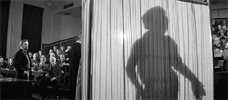
The Elephant Man
1980 -

My Bloody Valentine
1981 -

Who Can Kill a Child?
1976 -

Cannibal Holocaust
1980 -

Let Sleeping Corpses Lie
1974 -

John Carpenter’s Vampires
1998 -

Jaws 2
1978 -

A Warning to the Curious
1972 -
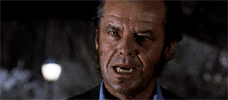
Wolf
1994 -

The Survivor
1981 -

Cannibal Ferox
1981 -
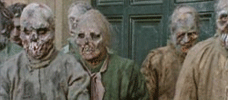
The Nights of Terror
1981 -
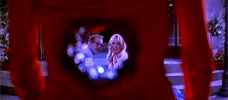
Death Becomes Her
1992 -

Alice, Sweet Alice
1976 -

Body Double
1984 -
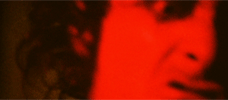
Invocation of My Demon Brother
1969 -

Phantasm II
1988 -

Emanuelle and the Last Cannibals
1977 -

The Wicker Man
1973 -

Maniac Cop
1988 -
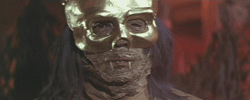
The Legend of the 7 Golden Vampires
1974 -
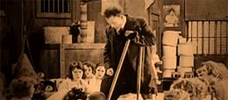
The Penalty
1920 -

Boxing Helena
1993 -

Chew on This
2005 -

Night of the Creeps
1986 -

Night of the Lepus
1972 -

Near Dark
1987 -

Army of Darkness
1992 -

The Brood
1979 -

The Lift
1983 -

Amsterdamned
1988 -

Silent Witness
1999 -

The Shaft
2001
We don’t do comments anymore, but you may contact us here or find us on Twitter or Facebook.



